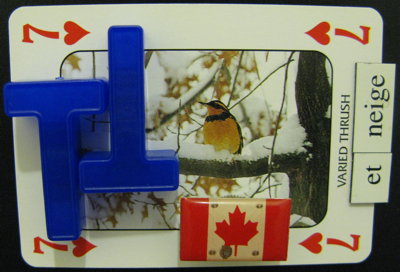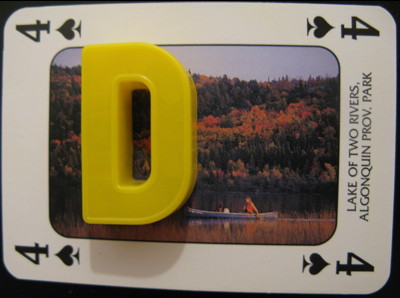Posts Tagged lipogram
Three of Diamonds: Stretch Marks
Posted by Angela Brett in Cadbury Heritage Collection, Writing Cards and Letters on February 23, 2009
 You feel my quickening heart
You feel my quickening heart
My heart marks you…
only my heart?
Quickening, you stretch my heart,
you feel my body…
only my body?
you stretch my body-part,
only you.
You… my heart,
you feel my quickening.
Only… you part.
Stretch marks part my heart,
stretch marks part my body.
My parts stretch,
My stretch parts.
Feel my part-you body part,
Feel my only part-you heart.
my part-you body marks my heart,
only, my body marks my part-you heart…
feel my part-you heart quickening,
feel my part-you heart stretch,
feel my part-you heart part.
Stretch marks part my heart,
stretch marks part my body.
Stretch marks, only stretch marks.
Jack of Diamonds: Papagaj and Rakas
Posted by Angela Brett in 52 ways to say I love you, Writing Cards and Letters on December 29, 2008
 Once upon a perch, there was a parrot named Papagaj. Papagaj was smarter than parrots are today. He could understand concepts that escape even humans.
Once upon a perch, there was a parrot named Papagaj. Papagaj was smarter than parrots are today. He could understand concepts that escape even humans.
Papagaj’s cage had many toys; perches, ladders, bells, and more. But the best toy by far was a bare rectangle of steel that reflected the most pretty parrot that Papagaj had ever seen. Papagaj called the parrot Rakas, and they adored each other. He loved to learn words, to amaze Rakas. The lovely Rakas always repeated the same words back. Rakas was the perfect parrot.
But Papagaj never knew enough words to express how he really felt about Rakas. Every day he would learn more words, every day he would teach them to Rakas, but every day he grew more frustrated that the words were not adequate to convey the love he felt. Just as Papagaj whacked the bars of the cage wherever he flew, he was hampered by lack of language whenever he attempted to express a thought. As the days went by, the thoughts themselves became harder to remember.
At dawn one day, as Papagaj cooed sadly to Rakas, a spectacular creature appeared. The creature was small enough to fly between the bars of the cage, but had a powerful sparkle that extended as far as Papagaj’s most puffed-out feathers could. The two thus appeared as large as each other.
“You wish for more words” came the thought. Papagaj could not hear the creature speak, but felt the message, unobstructed by flawed language. “I am the Kaantaaja. I can give you a new life, with different words. Come with me.”
Papagaj had barely resolved to do so when the Kaantaaja’s glow engulfed the cage.
*
When Papagaj opened his eyes again, he was in a different cage. It was a bit bigger than the first one. His perches remained, but the other toys had changed. There were swings, and ropes, and other things he had never seen. But as before, the best toy was the mirror, now hanging from shiny chains. Papagaj rushed toward Rakas and began to speak with much excitement.
Papagaj found that he knew different words from before. He was ecstatic to have the chance to say things that he had never said before. But soon he discovered that the words he knew before were gone, and, as before, many other ideas that he had never had words for. He was just as restricted as before when trying to express his emotions.
That evening, the Kaantaaja came back. “Are you happy with your new language?” it asked.
The answer ‘no’ entered Papagaj’s head without much consideration.
“I can’t keep granting your wishes forever,” said the Kaantaaja. “But I will move you to a new cage.” And with that, the Kaantaaja’s radiance once again permeated the cage.
*
When the light dispersed, Papagaj was in a pretty silver cage, a little smaller than the first, stuffed with perches, ladders, bells and swings. Rakas was reflected in a gleaming metal rectangle, attached with a jingling chain.
Papagaj revelled in the new language he knew, and shared with Rakas many things which he hadn’t yet shared. But again he was restricted, again his limits made him sidestep the things that needed saying. By dusk, he was screeching in anger at his clumsiness.
The Kaantaaja reappeared as he shrieked. “Please, do not misuse my gift of language so! Do you want to speak, or don’t you?”
Papagaj’s shriek ended the instant Kaantaaja’s query entered his head. His answer was a clear yes, with the caveat that he needed a new language.
Immediately, Kaantaaja’s light filled the cage.
*
When the light died down, Papagaj was in his biggest cage yet. There were all sorts of toys and places to perch and climb. He flew around a little, enjoying the space, before locating his mirror. Rakas looked happier than before.
They chattered all day, about so many things which had escaped them before. But still Papagaj found that there was still one essential emotion that he could not express. And as the day turned into night, he found more and more ideas for which the words escaped him. When the light was dim enough that he could no longer see Rakas, he kept talking to himself in the dark, trying to find a way to say what he needed to tell her, so that he could say it the next day. He repeated important words to himself, hoping not to forget them if he were put in a new cage with a new language.
But all this effort only made him more aware of how hopeless his situation was, and the moment he realised that the new words could not possibly be sufficient, Kaantaaja appeared again.
“You want to move,” said Kaantaaja silently.
Papagaj’s defeated yes caused another burst of Kaantaaja’s light.
*
Papagaj could hardly swing without colliding with rusty bars or a tiny food bowl, which hung in front of him, partially hiding his mirror. Papagaj hit at his bowl, not hungry, just wanting to look at Rakas without such an inhibition. It was obvious that his words, in this stifling micro-aviary, could not possibly do.
Papagaj sat dumb and unmoving for many hours, just looking at his ravishing bird, who was looking at him quizzically. By and by, Papagaj had a go at talking. It was a slow and awkward walk around untold limitations, which Rakas could mimid without so much as trying. Irritation, both at his own laborious toil and at Rakas’s natural parroting, soon took control of him. It was usually so gratifying to tutor Rakas on words, to applaud Rakas for copying him without fault. But with such difficulty in finding his own words, Papagaj was unfit to instruct, or to bask in Rakas’s flair for what was taught. Papagaj soon found it hard not only to talk highly of, but also to think highly of Rakas.
At last, Kaantaaja’s arrival brought comfort, with a great flash of light.
*
When the light cleared, Papagaj was in a much larger cage. But he could see that it was not as large as one of his previous cages, and he knew that once again his new language would not be adequate. He swung in silence until the Kaantaaja came, hoping to return to the richest language he had known, which he was sure he would be satisfied with.
“Do you want to go back to where you were before?” asked the Kaantaaja.
“I do,” he answered.
Kaantaaja’s glow filled the cage once more.
*
And he was back. He wasn’t back where he wanted, but in the smaller, silver cage. He remembered what had happened the last time, and realised that if he tried talking, he’d just end up frustrated again. He sat all day in silence.
The Kaantaaja didn’t even ask what he wanted. It was unnecessary. The flash filled him with dread-tinged expectancy.
*
The new cage was bigger than the last, not the biggest he’d been in. It had all of the toys he had loved. Again, he knew new words. And he resolved to speak, no matter how ineffectively. Alas, he had nobody to speak to. There was no mirror in his new home.
“Oh, Rakas… what a fool I have been!” he called in vain from the centre of the cage. “I can express my love in so many ways already, why did I always need more? Now, the most important thing is missing! I don’t need words, all I need is…”
With that, the Kaantaaja appeared once again and spread its shimmering light.
*
“Raaaaaaarrrkas!” Papagaj’s awkward caw sparks a grand fracas as Papagaj darts at a sassafras branch at a park. Hawks and jackdaws swarm, and chant “Rakas, rakas, rakas!” as smart as watchstraps.
Papagaj’s rasp attracts a star as fast and as sharp as Rakas. Papagaj, rapt, starts a stark paragraph. Rakas gasps at Papagaj’s haphazard grammar, and scrams.
Angst saps Papagaj, and Papagaj’s smarts pass. Papagaj and a standard madam hatch spawn as daft as gnats, and want that; an awkward caw dwarfs a swan’s charm.
Seven of Hearts: Varied Words for Snow
Posted by Angela Brett in Birds of Canada, Writing Cards and Letters on July 20, 2008
It’s macaronics de nouveau
écrit sur l’air de Words For Snow.
Des mots pour la neige (a line-by-line ‘literal’ translation of Words for Snow)

A seven of hearts featuring a varied thrush sitting on a snow-laden branch
Je respire l’anglais, l’air de rien
mais quand je respire le français,
c’est l’eau qui semble m’étouffer.
I took the plunge, and I’m aware
si je remonte, c’est moi qui perds.
Je parle français un peu de plus,
The air of English spreads diffuse
des petites bulles dans l’eau française,
a snow of words that Benoît says
C’est clair comme du cristal, même plus
I wish such grace could reproduce
My tongues hang out, mouthwat’ring pair.
Je veux en boire des rivières.
In melting snow I want to stay,
to swim like fish in Angel Bay
in fluid French that’s clear and fun.
Wine and cakes (a lipogram missing an English drink)
English is air I exhale,
French is a splash I expel,
choking on wine of my grail,
drowning in yield of my well.
l’Anglais je prends à la louche,
le français je crâche vers le ciel.
L’eau à la bouche qui me bouche
L’eau me lessive mais m’appelle.
Five of Hearts: Amiaivel
Posted by Angela Brett in Birds of Canada, Writing Cards and Letters on July 6, 2008

Once upon a time a queen was blessed with twin sons, which she named Nosch and Amiaivel.
Nosch fought his way out of the womb a few minutes ahead of Amiaivel, and thus thought himself the eldest. He knew that this meant he would become king, so he always demanded too many entitlements, and looked upon his twin as a slave. Amiaivel had a kind soul, and could not allow himself to deny his own twin’s demands. But the wise queen saw this, and as she began to get old, she announced to the people that Amiaivel would become king when she died.
Nosch was incensed that the second twin would steal his position, so he called upon a witch to cast a spell upon Amiaivel. The spell made Amiaivel, his fiancée Bella, and his maids into toads, and locked them in a dungeon beneath the vegetable patch.
Much time passed, and Amiaivel contented himself with talking and singing to his toad maidens. One day, a pixie floated in on a golden plume.
“Soon, the son of King Nosch will come to see you,” said the pixie. “He will demand the most beautiful shawl in existence. If you give him the one that the elves gave Bella as an engagement gift, then you will soon become human again, and be let back into the palace.”
As soon as the pixie had left, a young man descended into the toads’ dungeon.
“Excuse me, good toad,” he said. “I am Tais, the son of King Nosch. I seek the most beautiful shawl in existence. Can you help me?”
Though it pained him to give away such a valued keepsake, Amiaivel asked one of his maids to give it to him, and said, “This is the most beautiful shawl in existence, and one of my most valued posessions. Take it. I wish you good luck.”
Tais thanked him and left. By and by, the pixie came back.
“I must again ask a good deed,” she said. “The king’s son will come back seeking the most beautiful jewel in existence. If you give him Bella’s engagement band, then you will soon become human again, and be let back into the palace.”
In no time, the young man came back. “I am most unhappy to have to annoy you again, but I must find the most beautiful jewel in existence. Can you help me?”
Amiaivel hesitated to give up the symbol of his and Bella’s love, but knowing that the love itself would not lessen, he gave Tais the engagement band. “On this band is mounted the most beautiful jewel in existence, and one of my most valued posessions. Take it. I wish you good luck.”
Amiaivel sat glumly in his dull dungeon, awaiting the pixie. She fell into the jail with a potato plucked out of the soil above. “I can not yet fulfil my pledge, I must yet again ask you to give up something you love,” she said.
“I have nothing left to give. Make me human, I beg you!”
The pixie paid no attention to his plea. “This is a magic potato. If you put a lady toad in it, she will become human,” she announced. “When the king’s son comes to see you next time, he will need the most beautiful maiden in existence. Let Bella climb into the potato and leave with him, and you will soon become human again, and be let back into the palace.”
In a little while, Tais came to visit. “Again, I am most apologetic to ask an act of kindness. But I must fetch the king the most beautiful maiden in existence. Can you help me?”
Amiaivel had lost too much to his hateful twin, and could not give his fiancée to him as well. He gave the potato to Tais and showed him Puzchunza, his most beautiful housemaid. “Hollow out the potato and put this toad in it. The toad will become the most beautiful maiden in existence, and the one that I love the most. Take the maiden to the king. I wish you good luck.”
So the king’s son hollowed out the potato, and put the toad inside. As soon as he had done so, the toad became a maid, and the potato became a coach. Tais kissed the maid, and they left.
Again, Amiaivel sat and awaited the pixie. But she did not come. Many weeks he waited, until finally somebody came. This time it was Tais.
“Thou hast shown me immense kindness,” he said. “Because of thee, I have become king. In thanks, I would like to help thee,” he continued. “A pixie told me that thou beest my uncle, locked in a toad’s body by the late King Nosch. So I have found a good witch, who gave me this potion to heal you. Alas, she could not make enough to save thy housemaids.”
Amiaivel swallowed the potion, and instantly became human, still as young as he had been when he was enchanted. He went up to the palace, and was taken to Puzchunza, and given Bella’s engagement band. “Since this is the lady thou lovest the most, she will be thy wife.”
At once Amiaivel began to sob. “I lied. She is but my maid. My fiancée is still a toad! Oh, if only I had not been so selfish!” With that, Amiaivel dashed back into his cave, and found the middle pieces of potato which had been left behind. He massaged Bella with them, and soon she became human. But alas, not enough potato was left. She still had one leg like that of a toad, and skin pocked with boils. But she was still his beloved.
Amiaivel helped his fiancée to the palace, and soon they wed. Tais had fallen in love with Puzchunza, and was glad that she was not, in fact, Amiaivel’s fiancée. Those two also wed, and the two couples united to lead the kingdom with wisdom exceeding that of any single king.
Four of Spades: Lake of many Rivers
Posted by Angela Brett in Discover Ontario, Writing Cards and Letters on March 30, 2008


